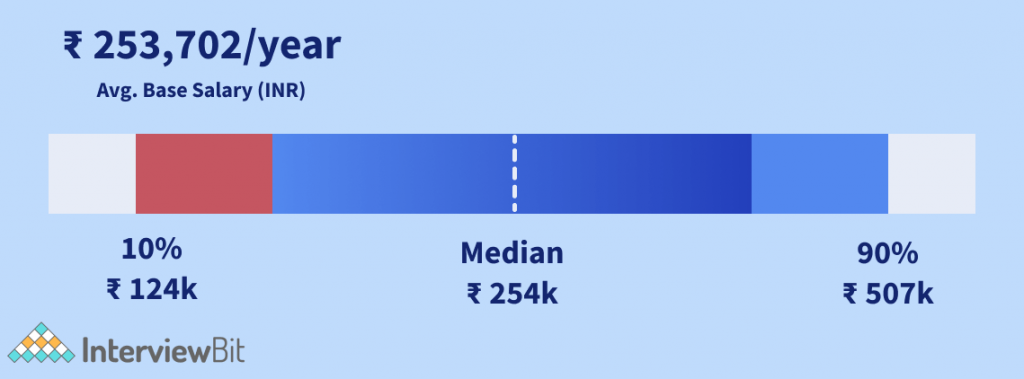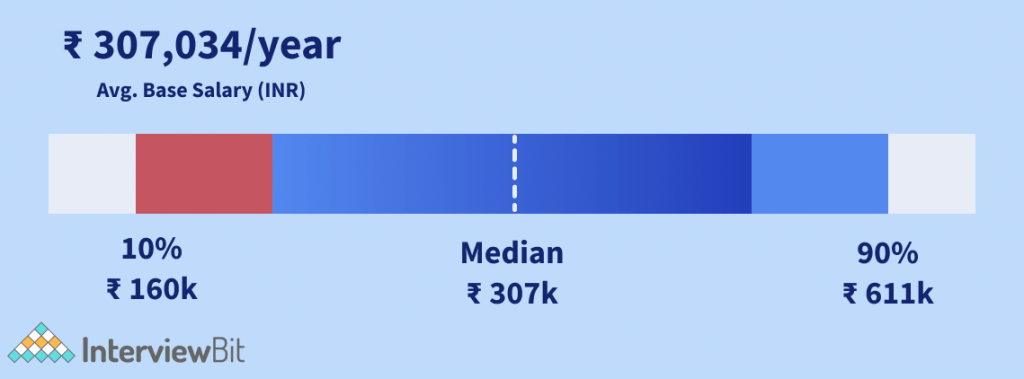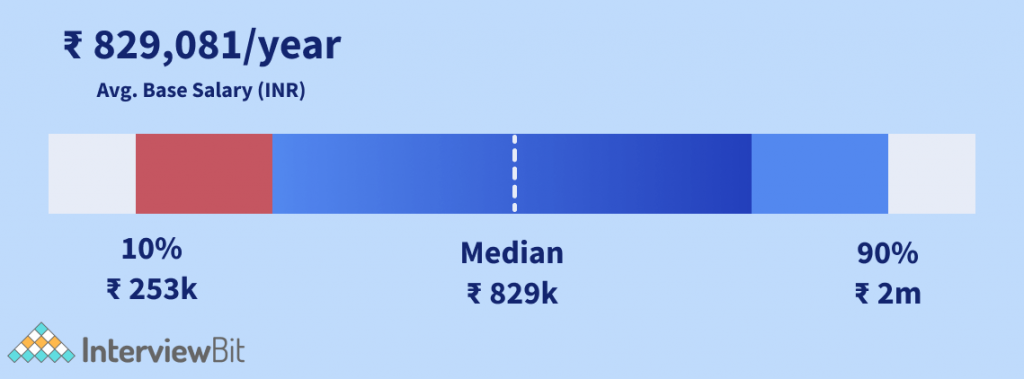- Types of Cyber Threats
- Who is a Cyber Security Engineer? What Do They Do?
- Cyber Security Salary in India
- Cyber Security Engineer Job Roles and Responsibilities:
- Required Skills for Cyber Security
- Education and Skill Set
- Top Companies Who Hire Cyber Security Engineers in India
- CyberSecurity Salary in Other Countries
- Summary
- FAQs
- Q.1: Is cyber security a good career in India?
- Q.2: Is cybersecurity a high-paying job?
- Q.3: Does Cybersecurity pay well in India?
- Q.4: Does cybersecurity require coding?
- Additional Resources

Physical security protects facilities and goods in the real world, whereas cybersecurity protects information systems and data. Cybersecurity is the practice of protecting servers, computers, electronic systems, networks, mobile devices, and data from destructive electronic attacks. Its goal is to protect assets against malicious codes and logins, and it may be utilized in a range of environments, including mobile computing and businesses. The worldwide cyber threat is rapidly evolving, with an increasing number of data breaches each year. According to a survey released by RiskBased Security, data breaches exposed 7.9 billion records in the first nine months of 2019. This is more than double (112%) the number of records disclosed in the same time period last year.
Types of Cyber Threats
1. Network Security
Network security, as the name implies, comprises preventing malicious or unauthorized individuals from getting access to the network. To sustain a company’s integrity, dependability, and usability, this is required. The incoming and outgoing traffic on the network must be closely monitored. Furthermore, you should have the required software installed to prevent cyberattacks, such as firewalls, anti-virus, VPNs, anti-spyware, IPS, and so on.
Confused about your next job?
2. Cloud Security
As IT firms aim to decrease their operational expenses, moving on-premises data to the cloud is becoming more popular. Users are now connected online, rather than via a traditional, secure stack, exposing them to hackers. As a result, you’ll need to ensure that the consumer and the cloud supplier are both secure. You must also gain control over IAM users. Well-known cloud providers such as AWS, GCP, and Azure are ready to supply you with a secure infrastructure in order to compete with current business expectations.
3. Application Security
Any application you release into the market is always vulnerable to cybercrime since it will come into contact with a large number of end-users and other stakeholders, resulting in network amplification. As a result, you must keep the data you save on the application database safe from those who have access to it. To enable controlled access to your app and its data, you should use a variety of tools and methods. During the development and deployment phases, you should also secure the app.
Who is a Cyber Security Engineer? What Do They Do?
This individual is in charge of protecting the organization’s assets from threats and must possess exceptional organizational, technical, and communication skills.
The job entails a focus on quality control within the IT infrastructure, including designing, building, and protecting scalable, secure, and robust systems, as well as assisting the company in understanding advanced cyber threats, working on operational data center systems and networks, and assisting in the development of robust strategies to protect the organizational structure. Routers, firewalls, switches, VPNs, and other network monitoring tools are also under their control.
A Cyber Security Engineer can detect cyber viruses, destructive defects, and hacking attempts. To defend the firm’s security in the future, the expert must maintain a watch of suspicious behavior and put in place solid system configurations.
Other cybersecurity engineer’s responsibilities include:
- Security measures for the protection of the organization’s data, systems, and networks are planned, implemented, managed, monitored, and upgraded.
- Identifying and resolving security and network issues
- All system and/or network security breaches must be addressed.
- Enabling the proper security controls to ensure that the organization’s data and infrastructure are safeguarded.
- Taking the necessary security precautions to protect the organization’s infrastructure and current data
- Responding to all network and associated system security breaches
- Participating in the process of change management
A cybersecurity specialist must be able to troubleshoot, identify unwanted access, and provide solutions for an organization’s system and network in terms of cybersecurity. ” Cybersecurity experts “perform the extremely precise duty” at the heart of the organization’s information protection efforts. “Your training, skills, experience, and education serve as barriers between your employer and threats and breaches, such as unauthorized access to data and information or system penetration.” A cybersecurity technician is also known as an IT security engineer since they provide security services for applications, the web, and data. According to the organization, “regardless of your title, you’ll be responsible for collaborating with other departments to implement security policies and safeguard IT systems.”
Cyber Security Salary in India
If you have more experience, your remuneration package will be greater. As a result, if you’re new to the industry, you’ll need to set realistic expectations. So, let’s have a look at how much a Cyber Security Engineer in India earns based on their years of expertise.
A. Salary Based On Experience
An entry-level Cyber Security Engineer with less than one year of experience can expect to earn an average total annual income of Rs.253,702. (which includes tips, bonuses, and overtime pay).

The average total compensation for an early career Cyber Security Engineer with 1-4 years of experience is Rs. 307,034 per year (average).

The average total compensation for a mid-career Cyber Security Engineer with 5-9 years of experience is Rs. 540,361 per year (average).
A Cyber Security Engineer with 10 to 19 years of experience earns an average annual total income of Rs. 829,081.

B. Salary Based On Location
Cyber Security Engineers salaries vary depending on where they work. There is a high demand for them in some nations, and they are well compensated, although a low-salaried location does not make a significant financial difference when compared to the other profession. According to PayScale data, Security Architects in various cities earn (on average) the following salaries:
| City | Salary (p.a) |
|---|---|
| Bangalore | ₹2,182,678/year |
| Chennai | ₹1,900,000/year |
| Pune | ₹2,137,764/year |
| Mumbai | ₹2,000,000/year |
| Hyderabad | ₹1,600,000/year |
C. Salary Based On Job Role
The salaries in this field vary according to your job role in the organization you are working for.
1. Cyber Security Engineer
A cybersecurity engineer’s annual compensation ranges from INR 4 lakhs to INR 8 lakhs per annum.

2. Cyber Security Analyst
A cybersecurity analyst’s annual compensation ranges from INR 5 to 6 lakhs.

3. Security Architect
A security architect’s annual pay ranges from INR 17-22 lakhs.

4. Cyber Security Manager
A cybersecurity manager’s average annual compensation is INR 12 lakhs.

4. Chief Information Security Officer (CISO)
A CISO’s average annual pay is Rs. 23 LPA.

5. Ethical Hackers
An ethical hacker’s annual pay ranges from INR 5 lakhs to INR 6 lakhs.

Cyber Security Engineer Job Roles and Responsibilities:
A Network Security Engineer’s Roles and Responsibilities are as follows-
- To ensure security, create and configure firewalls and intrusion detection systems.
- Keep security-related hardware and software up to date.
- Plan and keep an eye on the entire network system.
- Establish security policies.
- Install security infrastructure devices to ensure the security of your VPC, web protocols, and email.
- To detect harmful situations, conduct security and forensic analysis.
- Security measures for the protection of the organization’s data, systems, and networks are planned, implemented, managed, monitored, and upgraded.
- Enabling the proper security controls to ensure that the organization’s data and infrastructure are safeguarded.
Required Skills for Cyber Security
- A bachelor’s degree in computer science, information technology, systems engineering, or a related subject is required.
- Two years of expertise performing Cyber Security-related tasks such as incident detection and response, as well as forensics.
- Experience with firewalls and various forms of endpoint security, including its functionality, operation, and maintenance.
- C++, Java, Node, Python, Ruby, Go, or Powershell are examples of languages and tools.
- The ability to operate in a fast-paced, frequently stressful setting and have a keen eye for detail and exceptional problem-solving abilities.
- Knowledge of the most recent cyber security trends and hacker strategies is essential.
- Cyber Security Salary in India
Education and Skill Set
We all know that higher education leads to higher compensation, but how much more can you make with a degree? We divided Network Engineer earnings by education level to make a comparison. When a Network Engineer’s education level is a Certificate or Diploma, their average monthly income is 19,200 INR. A bachelor’s degree yields 29,100 INR a month, 52 percent more than a certificate or diploma. The average monthly payment for a Master’s Degree holder is 41,200 INR, which is 42 percent more than a Bachelor’s Degree holder.
The following are some of the specialized abilities that a network engineer is expected to possess:
- Engineering of networks.
- CISCO
- This is a wide-area network.
- Router
- Java
- Python
Top Companies Who Hire Cyber Security Engineers in India
- Microsoft.
- Salesforce.
- ACT Fibernet.
- Accenture.
- Thomson Reuters.
- Tata Communications.
- Capgemini Engineering.
- Deloitte.
CyberSecurity Salary in Other Countries
Network engineers’ pay varies by country, as it does for all other jobs. The most popular countries among Network Engineers are the United States, Canada, Australia, the United Arab Emirates, and the United Kingdom. Depending on experience, a network engineer’s income in these countries could range from 6000-7000$ per month to 10000-15000$ per month. These ranges offer incredible value to the rest of the world. As a result, many network engineers are concentrating on professional growth and getting more experience in order to work in these countries.
Summary
As companies invest more in SD-WAN, security, virtualization, and cloud computing, network engineers must focus on programming, security, storage, and systems, in addition to routing and switching. If they gain relevant experience, they can advance to senior network managers or other network management positions.
According to the US Bureau of Labor Statistics (BLS), computer network architects’ job prospects are predicted to improve by 6% between 2016 and 2026, which is about average for all occupations. Demand for their services will increase as most organizations want to extend their IT networks.
FAQs
Q.1: Is cyber security a good career in India?
Ans. Due to the high demand for competent specialists and a scarcity of qualified professionals, network engineers’ compensation, employment outlook, and opportunities are favorable. Choosing to work as a network engineer can be a rewarding and interesting career choice.
Q.2: Is cybersecurity a high-paying job?
Ans. The lowest-paid network engineers earn less than Rs.350,000 per year. They mainly work for smaller companies and have comparable obligations to an administrative assistant. Network engineers with the highest salaries earn around Rs.15,00,000 per year, with a few lucky ones earning more than Rs.20,00,000 per year.
Q.3: Does Cybersecurity pay well in India?
Ans. The average annual compensation of a Network Engineer is Rs. 4,68,500-5,00,000 per year (Rs.39,050 per month), which is Rs.81,000 (+21%) greater than the national average wage in India. On average, a Network Engineer may earn Rs.165,000-4,00,000 per year as a beginning salary. The highest-paid employees might earn up to Rs.9,00,000-15,00,000 per year.
Q.4: Does cybersecurity require coding?
Ans. Coding skills are not required for the majority of entry-level cybersecurity positions. However, some mid-level and upper-level cybersecurity tasks that you will become qualified for after a few years of experience may require you to be able to write and understand code.







 Join WhatsApp Group
Join WhatsApp Group


